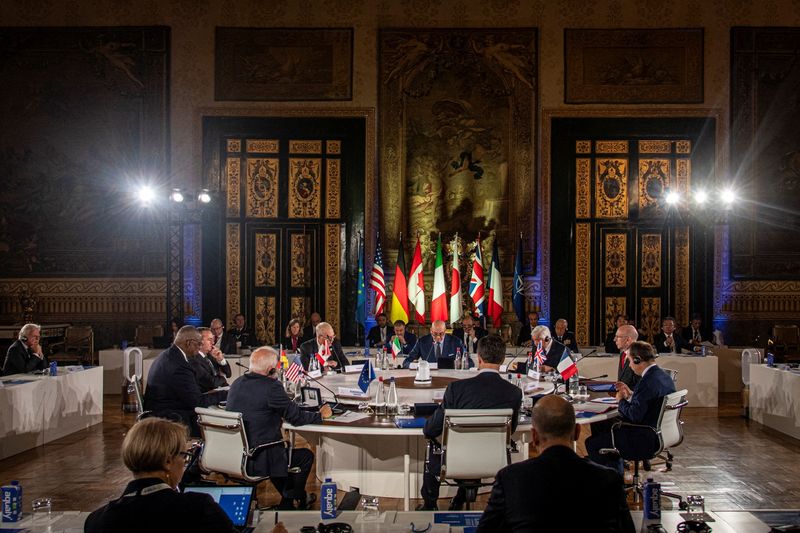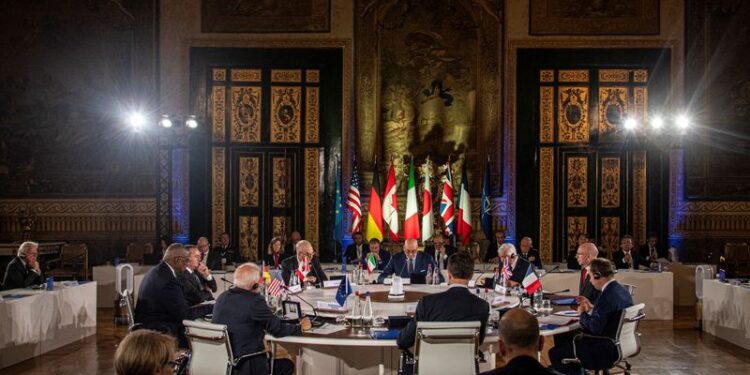By Angelo Amante
NAPLES, Italy (Reuters) -Defence ministers of the Group of Seven (G7) wealthy democracies on Saturday backed Ukraine’s “irreversible” path to NATO membership and expressed concern over threats to United Nations peacekeepers targeted by Israel in Lebanon.
The first ever gathering of G7 defence ministers took place as Israel and Lebanese armed group Hezbollah exchanged fire, with one drone directed at Israeli Prime Minister Benjamin Netanyahu’s holiday home, according to his spokesperson.
Italy holds the G7 rotating presidency for 2024 while the West also grapples with the Russian advance in Ukraine and China’s military activities around Taiwan, as well as heightened tensions along the border of North and South Korea.
Italian Defence Minister Guido Crosetto, who hosted the meeting in the southern city of Naples, told reporters the G7 could not solve global tensions alone, but needed to stimulate action across the international community.
“The G7 must be like a gadfly that has the strength to sting the rest of the world,” he said at a news conference.
Along with Italy, the G7 includes the United States, Canada, France, Germany and Britain. Representatives of NATO, the European Union and the Ukrainian defence minister Rustem Umerov also joined the talks.
In an earlier speech to kick off the meeting, Crosetto warned of a “deteriorated security framework” across the world and said near-term forecasts for conflict resolution “cannot be positive”.
Tensions are fuelled by confrontation between “two different, perhaps incompatible visions of the world,” he said.
In its final statement, the G7 backed Kyiv’s “irreversible path to full Euro-Atlantic integration, including NATO membership”.
This week, Ukrainian President Volodymyr Zelenskiy pitched his “victory plan” to the EU and NATO but failed to get the immediate membership invitation he was calling for.
German Defence Minister Boris Pistorius said he was worried by the North Korean contribution to the Russian war effort.
“(It) makes it clear that this conflict is spreading to other regions of the world in terms of its reach,” he said, as the G7 also expressed concern at China’s support to Moscow and Beijing’s recent military drills around Taiwan.
CEASEFIRE CALLS
Before the meeting, Crosetto welcomed photographers holding a model of a tiny red animal horn, a symbol of good luck according to time-honoured Neapolitan tradition.
The aerobatics team of the Italian Air Force flew over the Naples Royal Palace which housed the event, leaving behind the a trail of smoke in the red, white and green colours of the national flag in the overcast sky.
A few hundred demonstrators gathered under the rain, and paraded through the city centre holding Palestinian flags and asking for an immediate stop to the war in Gaza. Some minor clashes with police were reported.
The G7 joint declaration called for an immediate ceasefire in Gaza and the release of Israeli hostages still held by Hamas, saying attacks and retaliation risked “fuelling uncontrollable escalation in the Middle East”.
The EU’s chief diplomat Josep Borrell said Thursday’s killing of former Hamas leader Yahya Sinwar could raise the chances of an end to the conflict in Gaza, finally allowing more humanitarian support for the war-battered population.
He said the U.N. mission in Lebanon, known as UNIFIL which was recently targeted by Israel in its conflict against Hezbollah, could be made more effective but it would be up to the U.N. Security Council to make decisions on its future.

U.S. Defence Secretary Lloyd Austin said he would like Israel to scale back some of its strikes on Beirut and added that Israel had told him it had no intent to target UNIFIL in Lebanon.
Italy is a major contributor to UNIFIL which is stationed in southern Lebanon to monitor hostilities along the demarcation line with Israel. Israeli attacks have angered Prime Minister Giorgia Meloni, who visited Lebanon and Jordan on Friday.







